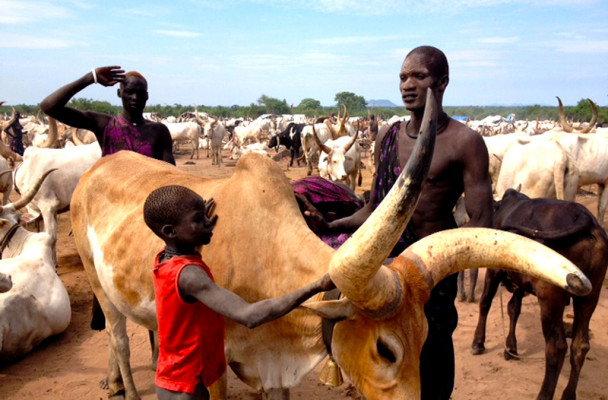Cattle, murder, and rape: How one dead man means the life of a girl

It all began with a murder.
And it ended with slavery, rape, and the destruction of a little girl’s life.
In South Sudan, cattle is taken very seriously. Fights over the valuable animals have killed 1,000 people since June in the new country, according to the United Nations. Tribes are using sophisticated means these days to steal cattle, including Thuraya satellite phones and heavy arms. But back in 2004, the day the murder took place, there were just two men and a gun.
The killer was the brother of an 8-year-old girl named Atia. He shot a man over a cattle dispute. What happened next was in keeping with Atia’s tribe’s tradition in the case of such murders. She was given to the dead man’s family.
Atia didn’t idly accept this—she fought her parents. But they threatened to kill her and she was sent to live with the man, to become his property.
“I was forced by my father to pay the price of the crime that my brother committed,” Atia told a local group called RIFE (Right to Information Freedom and Empowerment) in 2010. RIFE documented Atia’s story, and I’m recounting it from their reporting.
And the story gets worse, at least in its details. I’ll continue.
The family Atia was forced into had two brothers left, after losing one in the murder that brought her to them. “Each of the brothers could come and sexually sleep with me with the intention to produce a child that will replace the late one, and if I refused, they beat me,” Atia said. She described her life as “desperate” and “painful.”
After a year, she was forced to become a wife to one of the brothers. She was 9 years old.
At 14, she became pregnant. The baby received neither pre- nor postnatal care and died.
Atia’s husband then died and she was passed to the other brother without her consent.
What has happened to this little girl is not unusual, according to Godfrey Victor Bulla, the director of RIFE, but it is illegal in 2011 in South Sudan—which recently became the world’s newest country. However, Bulla told me, “The good constitutional provision that gives rights to women ended in paper.”
Despite public demonstration by women against this practice, “it happens as often as the crime of murder or manslaughter happens in any community, but here it’s more because of cattle rustling,” Bulla said. “So these stories are very common. Even as we talk now, there might be a function/ritual of this kind taking place.”
Giving girls as repayment is traditional in the Acholi tribe in Northern Uganda and South Sudan, in addition to many others tribes. The chairman of Acholi religious leaders, John Baptist Odama, wrote in an address in acceptance of the 21st Niwano Peace Prize Award in Japan in 2004:
“The girl-child given at the age of 6 to 10 years would become, by adoption, a daughter to the victim’s community. Compensation was not a punitive imposition but it was deemed as a process for healing, affirmation of personhood and for the enhancement of life within the community. Compensation, therefore, opened the gateway of reconciliation so both sides can walk through and approach each other (reconciled with one another).”
He considered the positive side to this form of restitution: “The willingness and readiness of the offender’s community to sacrifice one of their daughters to the victim’s community affirmed the genuineness of their commitment to peace and co-existence through the whole process of reconciliation. The presence of the girl-child as a new member in the victim’s community becomes a ‘bridge of communication’ to both communities who were formerly aggrieved and cut off from each other. Her physical presence and life guaranteed life to all in both communities. It was as if her presence and life was a recreation of both communities. She was therefore a guarantee of life and peace to recreated people and transformed communities on both sides.”
Odama also alluded to the negative side of handing over girls as payment, calling the practice “gender oppressive and violation of the rights of the girls child who was sacrificed on behalf of the entire offender’s community.”
I’ll leave you with words from Bulla, who is working to end the use of girls as a stopgap in community discord.
He told me that girls often commit suicide when left in the abusive hands of a family suffering the loss of one of its sons from murder and sees the girl as the enemy. Atia told RIFE that she had tried to kill herself twice.
But, Bulla said, “If that girl dies there, they will come for another.”
I’m trying to find out where Atia is now. When I hear something, I’ll write an update here.
One Response to “Cattle, murder, and rape: How one dead man means the life of a girl”
the story that your about sexual abuse in south sudan against women is true, men have given themselves impunity to comite sexual abuse against woemen in any kinds.so our women in south sudan are really in danger so i call on the world to help them/.am a student of law juba university and the head of RIFE, we are trying to see that our women have the best life because they are the heart of the life